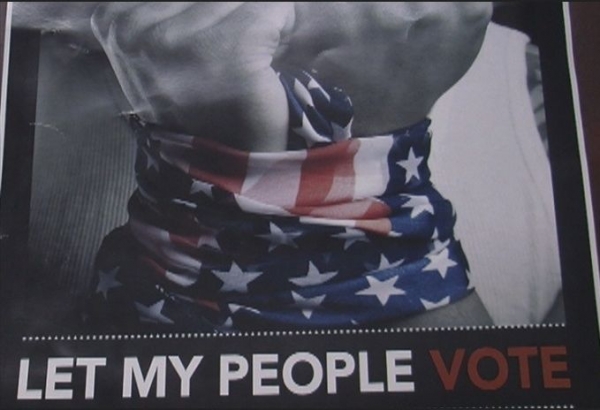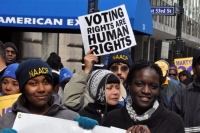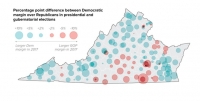That campaign is a proposed 2016 ballot measure called the Voting Restoration Amendment. It would end one of the country’s worst Jim Crow-style laws, which now forces ex-felons to wait at least 16 years before possibly regaining their right to vote. This proposed constitutional amendment would erase that punitive waiting period, and likely lead to hundreds of thousands of additional voters in major elections.
Organizers know the stakes, which could push politicians to address long-ignored social justice issues. But they said that they were not getting financial support to hire petition circulators to gather nearly 700,000 signatures required to put it on the 2016 ballot.
“That’s one of the biggest questions that remains to be answered,” said Desmond Meade, president of the Florida Rights Restoration Coalition. “Knowing the possible implications of the initiative, and knowing how it would have the ability to transform this entire nation, I’m wondering where are the people who are supportive of change here?”
So far, only a handful of mostly state-based civil rights, voting rights, anti-poverty and church groups have stood behind the measure. An unspoken part of the wider resistance may be a stigma attached to being an ex-felon, Meade said. However, what many people do not realize is that after years of Republican rule in Florida, the state counts non-violent drug and property offenses as felonies, while other states do not. Indeed, one-third of all arrests in Florida are drug-related, according to FBI crime statistics.
“One of the misconceptions that people have when they think about rights restoration is they think it’s for people that are in prison,” Meade said. “Only 25 percent go to prison. The rest of the individuals are in communities. They are on probation. They get a form of suspended sentence. The majority of people convicted of a felony do not go to prison.”
“Right now, close to 2 million people cannot vote from a felony conviction,” Meade explained. “There’s only 101,000 people that are incarcerated. About 135,000 are on probation and parole. That’s 235,000 of the almost 2 million. Where are all these other people? They are in their homes, in our communities, in our congregations, and in some cases, they’re even in our pulpits.”
There are about 6 million ex-felons who are disenfranchised nationwide, according to The Sentencing Project. Nationally, nearly 8 percent of Blacks cannot vote because of felon disenfranchisement, which skews the electorate and political process. The three worst states are Florida, Kentucky and Virginia, but no state is as bad as Florida, where one-tenth of its eligible voting population cannot do so because of felon disenfranchisement, including 23 percent of blacks. Florida had about 12 million registered voters in 2014; about a third were non-white.
The process to regain the vote in Florida is draconian and glibly defended by top-ranking Republicans. First, there’s a seven-year waiting period after a sentence is finished before a re-enfranchisement application can be filed. The ensuing state review is now taking nine-years. Finally, Florida’s governor must sign an order to revive the voting rights. In the meantime, any minor infraction can derail the re-enfranchisement process—even a speeding ticket.
After the 2010 election, Florida’s new GOP Gov. Rick Scott toughened ex-felon voting laws. He reversed his predecessor’s 2007 procedures that restored voting rights and instituted a minimum five-year wait. “For those who may suggest that these rule changes have anything to do with race, these assertions are completely unfounded,” said Florida’s GOP Attorney General Pam Bondi, in March 2011. Scott, speaking at the same time, said the long wait deterred crime. “It is important that this form of clemency be granted in a deliberate, thoughtful manner that prioritizes public safety and creates incentives to avoid criminal activity.”
“As it stands, if you had completed your sentence today, you would have to wait until 2022 before you could even apply or submit an application to get your rights restored,” Meade said, describing the barriers. “Today, in 2015, the state’s clemency board is still working on applications that were submitted in 2006… Even if you applied in 2022, it would not be until 2031 until you had the opportunity to have a chance. And even after you have waited 10 to 17 years, if you so much as get a speeding ticket you are disqualified.”
Academics who have studied the impact of felon disenfranchisement have traced serious national and state impacts, from affecting the outcome of presidential and federal elections to perpetuating political status quos that ignore race and poverty issues.
The most striking example from Florida concerns the 2000 presidential election. If even 1 percent of Florida’s 600,000 ex-felons—the figure at that time—had voted, their likely 70 percent support of Democrats—the figure found by academics who analyze the partisan implications—then Al Gore would have been president, not George W. Bush. Since then, Florida’s population and political impact has only grown. It now has 29 Electoral College votes—the same as New York—making it the third highest in the country. In Kentucky, had 75,000 disenfranchised felons in 1984 been able to vote in a U.S. Senate race, then Mitch McConnell, the current Senate Majority Leader, would have almost certainly lost to the Democrat—who McConnell narrowly beat by almost 5,300 votes.
Inside Florida, ex-felon disenfranchisement continues to undermine communities of color and the poor. If between 15 percent and 25 percent of the former felon population voted in non-presidential years, as academics have found in other states, then it’s arguable the make up of its state Legislature would be different—and not abruptly adjourning, as it did last week, during a debate on whether to expand Medicaid, the state-run health plan, to an estimated 764,000 low-income people.
It’s arguable that other ballot initiatives, like a 2014 measure legalizing medical marijuana, would have gotten 60 percent of the vote that it needed to passed. In other words, when it comes to many needed reforms, felon re-enfranchisement can be a key to changing the political complexion and agenda in state and national politics.
One might think that awareness would motivate the Florida Democratic Party, and other progressive groups, to work to get the ballot measure on the fall 2016 ballot. The FDP did not respond to AlterNet’s request for a comment on its position.
“When you think of the impact of state initiatives, most are confined to the borders of that state,” Meade said. “This is unlike a typical state initiative, because its impact would transcend the state of Florida. Because of that we deserve more attention and more support in building this campaign so we can be viable in 2016.”
Link to original article from AlterNet


 Imagine going to the polls on Election Day and discovering that your ballot could be collected and reviewed by the
Imagine going to the polls on Election Day and discovering that your ballot could be collected and reviewed by the ACLU Blueprints Offer Vision to Cut US Incarceration Rate in Half by Prioritizing 'People Over Prisons'
ACLU Blueprints Offer Vision to Cut US Incarceration Rate in Half by Prioritizing 'People Over Prisons'  "These disasters drag into the light exactly who is already being thrown away," notes Naomi Klein
"These disasters drag into the light exactly who is already being thrown away," notes Naomi Klein  How about some good news? Kansas Democratic Representative advances bill for Native Peoples.
How about some good news? Kansas Democratic Representative advances bill for Native Peoples.  What mattered was that he showed up — that he put himself in front of the people whose opinions on
What mattered was that he showed up — that he put himself in front of the people whose opinions on On a night of Democratic victories, one of the most significant wins came in Virginia, where the party held onto
On a night of Democratic victories, one of the most significant wins came in Virginia, where the party held onto A seismic political battle that could send shockwaves all the way to the White House was launched last week in
A seismic political battle that could send shockwaves all the way to the White House was launched last week in In an interview with Reuters conducted a month after he took office, Donald Trump asserted that the U.S. had “fallen
In an interview with Reuters conducted a month after he took office, Donald Trump asserted that the U.S. had “fallen Attorney General Jeff Sessions overturned the sweeping criminal charging policy of former attorney general Eric H. Holder Jr. and directed
Attorney General Jeff Sessions overturned the sweeping criminal charging policy of former attorney general Eric H. Holder Jr. and directed